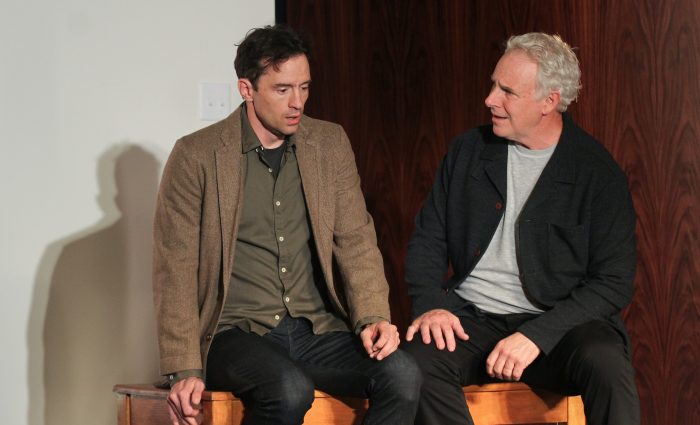
A Number by Caryl Churchill, through June 9, 2019, at People’s Light Theatre, Malvern, PA
A Pennsylvania political figure — who was raised as an only child — this month disclosed that he recently learned that he has a number of siblings. But now he knows that his father, using different names, married multiple women and abandoned them and all his children.
With this disturbing news on my mind, I attended the Peoples Light production of A Number, a drama by Caryl Churchill.
At the start, we meet Bernard (played by Nathan Darrow) who tells his father named Salter (John Dossett) he’s just learned he has a clone — or clones. He’s been told there are “a number.” His attitude is amazement and curiosity, because up til now he believed he was unique. His father seems puzzled to hear this, and wants to hire an attorney to look into the matter.
The play is a fascinating exploration of everyone’s perception of their identity, with complex emotions expressed in pithy language. The story is crisply told in four scenes running less than an hour.
Scene Two introduces Darrow as Bernard’s identical alter ego, an angry man who believes that he’s the original son. He accuses the father of feeling so disappointed with the boy that he arranged for the creation of a clone so he could, possibly, get a better result. He raised one of them himself, and there are multiple replicas who were raised in different families.
I won’t disclose the remainder of the plot, but it becomes apparent that Salter’s presentation in the first scene was fraudulent. Both Bernard and the audience learn that the truth was intentionally falsified.
A Number poses the disturbing question — how would you feel if you walked down a street and suddenly bumped into a mirror image of yourself? Churchill’s script warns of the perils that accompany artificial human reproduction, and also with the placing of adoptees.
Darrow’s quick transformation between his characters is breathtaking. By facial expression and body language, and a minimal costume change, he convinces us that he’s different people. The respected, veteran Dossett does a fine job in his less-spectacular assignment.
Eliza Baldi directs clearly and simply. Andrew Moerdyk’s set startlingly displays mirror images at a key moment.